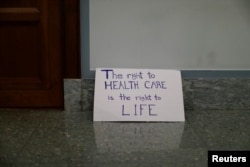The latest Republican effort to overhaul the nation's health care system appears to have failed after another Republican senator came out against the plan.
Senator Susan Collins from Maine became the third Republican senator to oppose the measure, saying Monday night, "This is simply not the way that we should be approaching an important and complex issue that must be handled thoughtfully and fairly for all Americans."
Collins' announcement came after the Congressional Budget Office said the attempt to end the Affordable Care Act, also known as Obamacare, would reduce health insurance coverage for "millions" of people.
With 52 seats in the 100-member Senate, Republicans could afford only two "no" votes from their ranks if the health reform bill were to pass, given unified opposition from Democrats.
Previously, two Republicans, John McCain of Arizona and Rand Paul of Kentucky, had announced their opposition to the legislation.
The only remaining hope for Republican party leaders is to change opponents' minds.
Earlier Monday, U.S. senators alternately criticized or defended the last-ditch Republican attempt to end Obamacare at the only committee hearing to examine the bill.
Wheelchair-bound demonstrators chanting "No cuts to Medicaid" delayed the start of the hearing by nearly 20 minutes to the irritation of the Senate Finance Committee's chairman, Republican Orrin Hatch of Utah.
"If you want a hearing, you'd better shut up," Hatch warned before calling a brief recess so police officers could remove the protesters. When the hearing resumed, he pleaded, "Let's have a civil discussion."
At issue is Graham-Cassidy, the Republican bill that would break up Obamacare, transfer funding to all 50 U.S. states to craft their own health care programs, and pare back federal dollars for Medicaid, a program that pays medical costs for the poor and disabled. Republicans have until the end of the month to pass the bill with a simple majority vote in the Senate.
Proponents argued the status quo will bankrupt America.
"By 2027, we're going to be spending more on Medicaid than on the [U.S.] military," said Republican Senator Lindsey Graham, who co-authored the bill with Senator Bill Cassidy of Louisiana, testifying as a witness before the committee. "We're going to send this money back to the states. … My goal is to get the money and power out of Washington, closer to where people live.
"We're going to get a better outcome," Graham added.
Opponents accused Republicans of rushing to pass a poorly-crafted bill that will leave dozens of states with less health care funding.
"This Trumpcare bill is a health care lemon, a disaster in the making," said the committee's top Democrat, Ron Wyden of Oregon. "It's going to be a nightmare for tens of millions of Americans, and it makes a mockery of the president's promise of better insurance for everybody, at lower cost."
President Donald Trump has blasted Senate Republicans for failing to repeal and replace Obamacare, one of the party's core promises to voters since the law was enacted in 2010.
"7 years of Repeal & Replace and some senators not there," Trump lamented on Twitter on Sunday. A day earlier, he tweeted, "Large Block Grants to States is a good thing to do. Better control & management."
Democrats noted that a bipartisan effort was under way to fix Obamacare's shortcomings without scrapping the law entirely, but said the effort has been undermined by Graham-Cassidy, the latest in a series of Republican attempts to reform health care on their own.
"Millions of lives are at stake. Let's return to the bipartisan negotiations," urged Senator Mazie Hirono of Hawaii. "This is exactly how we should approach health care in our country."
Republican leaders tried on Sunday night to persuade senators on the fence to vote for Graham-Cassidy by adding additional health care funding to their states, including the states of Maine, Arizona and Kentucky.
McCain provided the decisive "no" vote that torpedoed a previous Republican health care bill in July. The Arizona senator argued the bill had not been properly vetted in committee, a criticism he repeated last week in explaining his opposition to Graham-Cassidy.
Dachog Duzor in Washington contributed to this report.









